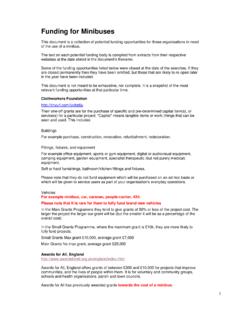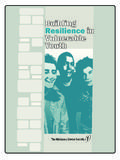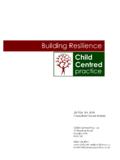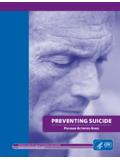Transcription of Funding for Core Costs - involve community services
1 Funding for core Costs This document is a collection of potential Funding opportunities for those organisations needing Funding to cover core Costs . The text on each potential Funding body is compiled from extracts from their respective websites at the date stated in the document's filename. Some of the Funding opportunities listed below were closed at the date of the searches. If they are closed permanently then they have been omitted, but those that are likely to re-open later in the year have been included. This document is not meant to be exhaustive, nor complete. It is a snapshot of the most relevant Funding opportunities at that particular time. Tudor Trust Tudor makes grants, and provides other types of support, to voluntary and community groups working in any part of the UK. They particularly want to help smaller, community -led organisations which work directly with people who are at the margins of society: organisations which support positive changes in people's lives and in their communities.
2 Because they try to respond to the needs identified by organisations themselves, many of their grants take the form of core Funding : Funding which goes towards the core Costs of running an organisation, including salaries, overheads and day-to-day running Costs . Sometimes they may look at offering unrestricted Funding , through a grant which can be used entirely freely to further an organisation's charitable objectives. Usually grants are made over one, two or three years. They understand that tackling deep- rooted problems takes time so they sometimes fund over a longer period, usually by making a further grant following on from the original one. However, their interest in supporting work in the longer term has to be balanced against their need to encourage new groups and new thinking. This means that their Funding can't continue indefinitely. They can also provide project grants, capital grants for buildings or equipment and grants to help strengthen your organisation.
3 There is no maximum or minimum grant. In some situations they may look at making a short-term loan if this is the most helpful solution and you can demonstrate how you will pay it back: if you are interested in loan Funding please ring the Information Team on 020 7727 8522 for advice before making an application. The Tudor Trust wants to support smaller groups, embedded in their communities, which work directly with people who are on the edges of mainstream society in ways which encourage inclusion, integration and independence. They are particularly interested in supporting work that develops and promotes the social connections and relationships which make such an important contribution to the well-being and quality of life of individuals, and which strengthens communities. One of the crucial things they look for in the applications we receive is a strong focus on support for the most marginalised - on those individuals and communities who have limited access to resources and opportunities.
4 Tudor's trustees are also particularly interested in supporting smaller, under-resourced organisations: in their experience smaller organisations are particularly well-placed to deliver positive change because they know their communities and can be highly responsive to need, providing an individualised and holistic response to the people they support. The best smaller- scale organisations also encourage participation and inclusion and contribute to the resilience of communities by offering opportunities for connection and engagement. 1. They are therefore much more likely to fund groups with an annual income of less than 1. million. In practice the majority of the organisations they support are much smaller than this: last year over 80% of our grants went to groups with an annual income of less than 500,000. Allen Lane Foundation Type of Grants The Foundation makes grants for start-up, core or project Costs . These grants are relatively small.
5 Examples of types of grants they make could be: Volunteers or participants expenses Venue hire Part-time or sessional staffing Costs Work aimed at strengthening the organisation such as trustee or staff training They fund particular beneficiary groups currently these are: Asylum seekers and refugees Gypsies and Travellers LGBTQ communities Migrant communities Offenders and ex-offenders Older people People experiencing mental health problems People experiencing violence or abuse Activities: Some examples of the kind of activities which might be suitable for Funding are: Provision of advice or information Advocacy Arts activities where the primary purpose is therapeutic or social Befriending or mentoring Mediation or conflict resolution Practical work, such as gardening or recycling, which benefits both the provider and the recipient Self-help groups Social activities or drop-in centres Strengthening the rights of particular groups and enabling their views and experiences to be heard by policy-makers Research and education aimed at changing public attitudes or policy Work aimed at combating stigma or discrimination Work developing practical alternatives to violence Grants Their maximum grant is 15,000.
6 The average grant size is around 5,000- 6,000. The Foundation makes single grants, or grants for two or three years. Esmee Fairburn Foundation 2. The Foundation aims to improve the quality of life for people and communities in the UK both now and in the future. They do this by supporting organisations that do charitable work in the: arts with children and young people environment social change. Their grants support organisations' core or project Costs , including staff salaries and overheads. They do not fund building or equipment Costs , or individuals. 2015 grants ranged from 5k to (median average 100,000), with support lasting 1 - 5 years (45% 3 years). Across all their Funding they aim to unlock and enable potential, back the unorthodox and unfashionable, build collective networks and catalyse system change. Arts Organisations at a pivotal point - organisationally or artistically Development of emerging talent Art as an instrument for social change, community cohesion or participation Children and Young People Social and emotional development of disadvantaged children and young peopleThe rights of vulnerable children and young people Addressing root causes of low educational attainment and challenging behaviour Civic and political participation for young people under-represented in decision- making Young people leaving care Environment Connecting people with nature Large-scale conservation of natural environments on land and at sea Countering the effects of damaging human activities Lesser known plants.
7 Animals and organisms Social Change Participation marginalised and excluded individuals and groups Place revitalising community life Injustice systemic change around injustice and inequality Food Local innovation in alternative approaches Food and wellbeing Working towards a more coherent food sector Comic Relief Main Grants They will allocate Funding under four programme areas: Investing in children and young people to be ready for the future. Empowering women and girls so they're safe and free to lead the lives they choose. Improving health and wellbeing of vulnerable and disadvantaged people. Building stronger communities in areas of disadvantage, deprivation and poverty. They will fund revenue Costs , such as salaries, and are willing to fund small capital items, such as office furniture and computers. They won't usually fund building Costs , the purchase of vehicles and land or heavy equipment unless it can be clearly shown that such expenditure is proportionately small, in relation to the overall budget, and adequately justified as essential to the proposed activity.
8 A list of recently awarded grants is at: 3. Grants range from 20,000 to 250,000. Children in Need Children in Need give grants for children and young people of 18 years and under experiencing disadvantage through: Illness, distress, abuse or neglect Any kind of disability Behavioural or psychological difficulties Living in poverty or situations of deprivation Their Main Grants Programme is for grants over 10,000 to support projects for up to three years. There is no upper limit for Main Grants but they make very few grants over 120,000. and most grants are for much less. BBC Children in Need will only fund direct project Costs , that is, Costs that relate clearly and directly to a project. These can include salaries, volunteer expenses, building hire Costs and travel Costs . In many cases project Costs also include less delivery-focused aspects such as line management, administration, insurance and utilities. They will not fund organisational overheads or running Costs which the organisation would incur whether the project was running or not.
9 (Although they will consider Funding support Costs incurred as a direct result of running the project.). Lloyds Foundation Their new grant programmes launched from April 2014 Invest, Enable and Enhance offers short and long term grants. Support will be adapted to the needs of small and medium sized charities (income between 25,000 and 1 million) that are committed to delivering work which breaks or prevents cycles of disadvantage. Invest provides longer term core or delivery Funding for charities which meet the programme aim and are delivering clear outcomes as a result of their work. Invest grants are from 10,000 up to maximum of 25,000 per year for two or three years, with the opportunity for continuation Funding for a further period up to six years in total. Invest grants fund core organisational Costs , meaning those related to the day to day running of your charity. Requests for core Costs will only be considered where the majority of your charity's work (more than 50% of your work and expenditure) meets their eligibility criteria.
10 They also fund Costs associated with the direct delivery of your work. The core Costs and direct delivery Costs they support are summarised below: core Costs Direct Delivery Costs Building running Costs Salaries Rent Recruitment Utilities Sessional workers Heating and lighting Volunteer expenses Insurance Travel 4. Office Costs Training Stationery Monitoring and evaluation IT running Costs Promotion Management Costs Activity Costs Part- Funding or Funding of salaries Finance/admin/back office Enable grants provide a great opportunity to strengthen eligible charities so they can deliver more effectively, and are awarded to eligible charities that have identified clear development areas. Enable grants are up to a total of 15,000 over one or two years, and can reinvigorate charities through Funding organisational improvements, development of areas such as leadership and governance, improved systems and demonstrating outcomes. These developments put charities in a stronger position to better deliver services and attract Funding .








